G. Wayne Miller's Blog, page 3
December 28, 2023
Burnt Cove: A Murder Mystery Set in Maine
Originally titled "Memory," the novel "Burnt Cove" will be my 22nd published book when it is finished sometime in the year 2024.
This is the opening.

Chapter 1
A passerby traveling the road that descends intothe village of Stonington on Deer Isle, Maine, at eleven o’clock on thatcloudless morning of Thursday, June15, would have observed a scene that couldhave been described as peaceful and pretty.
Framed by a white chapel to the left and theharbor with the emerald stepping-stone islands of Merchants Row beyond to theright, a cemetery withits carefully trimmed grass and abundance of weathered tombstones presenteditself as picturesque in that quintessential old coastal New England way. Theoaks and maples shimmered with fresh young leaves in a spring that last weekhad turned unseasonably warm, a delightful development, all agreed, after awinter that had continued stubbornly past Easter, when four inches of snowfell, ruining the egg hunt and sunrise services. Only the irregular mound ofback-hoed earth beneath an old green tarp would have brought unpleasantnessinto the passerby’s mind.
A new grave had been dug.
And there, next to it in a coffin, was itsdesignated occupant, about to assume permanent residence.
Measured numerically, the living who had joinedthe deceased in her final moments above ground constituted an unimpressiveassembly.
These were them: Fr. Bertrand Lombardi, the octogenarianpastor of Saint Mary Star of the Sea Church,home of the island’s only Roman Catholic parish; three part-time employees, thefull staff, of Bragdon-Kelley Funeral Home;and 16 mourners, all but one middle-aged or older. The oldest was awheelchair-bound man who was in the care of an aide and encased in an Afghan,despite the humidity and heat, 76 degrees and climbing.
And thus a passerby might have assumed that the dearlydeparted had been a person of no particular import, in the larger sense: alocal who had passed a quiet existence, troubling no one outwardly and likelyhaving made a meritorious contribution to the gene pool; and/or a native-bornreturned after decades from a more tax- and climate-friendly place (Florida, ifone had to guess). The sort of ordinary person who had been the subject ofordinary obituaries with an outdated head shot in the regional weeklies, TheEllsworth American and Island Ad-Vantages -- obituaries laced with“dearly” and “beloved” and “loving” and other such flowery adjectives composedby a funeral-home director with tearful input from a family member with nodesire for candor, let alone full disclosure, at this Most Difficult Time ofGreatest Need.
December 11, 2023
Twenty-one years ago today. RIP, Dad.
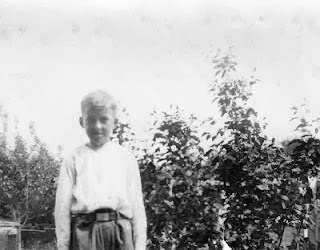
Author's Note: I wrote this 11 years ago, on the occasion of the tenth anniversary of my father's death. Like his memory, it has withstood the test of time. I have slightly updated it for today, December 11, 2023, the 21st anniversary of his death. Read the original here.
My Dad and Airplanes
by G. Wayne MillerI live near an airport. Depending on wind direction and other variables, planes sometimes pass directly over my house as they climb into the sky. If I’m outside, I always look up, marveling at the wonder of flight. I’ve witnessed many amazing developments -- the end of the Cold War, the advent of the digital world, for example -- but except perhaps for space travel, which of course is rooted at Kitty Hawk, none can compare.
I also always think of my father, Roger L. Miller, who died 21 years ago today.
Dad was a boy on May 20, 1927, when Charles Lindbergh took off in a single-engine plane from a field near New York City. Thirty-three-and-a-half hours later, he landed in Paris. That boy from a small Massachusetts town who became my father was astounded, like people all over the world. Lindbergh’s pioneering Atlantic crossing inspired him to get into aviation, and he wanted to do big things, maybe captain a plane or even head an airline. But the Great Depression, which forced him from college, diminished that dream. He drove a school bus to pay for trade school, where he became an airplane mechanic, which was his job as a wartime Navy enlisted man and during his entire civilian career. On this modest salary, he and my mother raised a family, sacrificing material things they surely desired.
My father was a smart and gentle man, not prone to harsh judgment, fond of a joke, a lover of newspapers and gardening and birds, chickadees especially. He was robust until a stroke in his 80s sent him to a nursing home, but I never heard him complain during those final, decrepit years. The last time I saw him conscious, he was reading his beloved Boston Globe, his old reading glasses uneven on his nose, from a hospital bed. The morning sun was shining through the window and for a moment, I held the unrealistic hope that he would make it through this latest distress. He died four days later, quietly, I am told. I was not there.
Like others who have lost loved ones, there are conversations I never had with my Dad that I probably should have. But near the end, we did say we loved each other, which was rare (he was, after all, a Yankee). I smoothed his brow and kissed him goodbye.
So on this 21st anniversary, I have no deep regrets. But I do have two impossible wishes.
My first is that Dad could have heard my eulogy, which I began writing that morning by his hospital bed. It spoke of quiet wisdom he imparted to his children, and of the respect and affection family and others held for him. In his modest way, he would have liked to hear it, I bet, for such praise was scarce when he was alive. But that is not how the story goes. We die and leave only memories, a strictly one-way experience.
My second wish would be to tell Dad how his only son has fared in the last 21 years. I know he would have empathy for some bad times I went through and be proud that I made it. He would be happy that I found a woman I love, Yolanda, my wife now for nine years and my best friend for almost two decades: someone, like him, who loves gardening and birds. He would be pleased that my three wonderful children, Rachel, Katy and Cal, are making their way in the world; and that he now has three great-granddaughters, Bella, Livvie and Viv, wonderful girls all. In his humble way, he would be honored to know how frequently I, my sister Mary Lynne and my children remember and miss him. He would be saddened to learn that my other sister, his younger daughter, Lynda, died in 2015. But that is not how the story goes, either. We send thoughts to the dead, but they send nothing back. We treasure photographs, but they do not speak.
Lately, I have been poring through boxes of black-and-white prints handed down from Dad’s side of my family. I am lucky to have them, more so that they were taken in the pre-digital age -- for I can touch them, as the people captured in them surely themselves did so long ago. I can imagine what they might say, if in fact they could speak.
Some of the scenes are unfamiliar to me: sailboats on a bay, a stream in winter, a couple posing on a hill, the woman dressed in fur-trimmed coat. But I recognize the house, which my grandfather, after whom I am named (George), built with his farmer’s hands; the coal stove that still heated the kitchen when I visited as a child; the birdhouses and flower gardens, which my sweet grandmother lovingly tended. I recognize my father, my uncle and my aunts, just children then in the 1920s. I peer at Dad in these portraits (he seems always to be smiling!), and the resemblance to photos of me at that age is startling, though I suppose it should not be.
A plane will fly over my house today, I am certain. When it does, I will go outside and think of young Dad, amazed that someone had taken the controls of an airplane in America and stepped out in France. A boy with a smile, his life all ahead of him.

My dad, second from top, with two of his sisters and his brother.
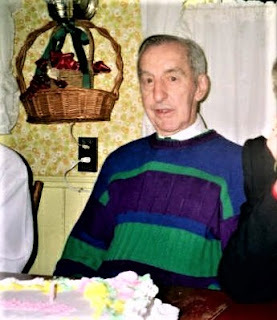 Dad, near the end of his life.
Dad, near the end of his life.
November 24, 2023
A discussion of "Unfit to Print" with the great John Busbee, host of Iowa's The Culture Buzz
Listen to my latest appearance on John's show, where I have been a guest several times. Thanks again, John! 'Til next time.
 John Busbee.
John Busbee.LISTEN!
November 4, 2023
What a year has brought: From Projo to Pell
One year ago today, I left The Providence Journal, where Ihad been a staff writer since 1981. I soon transitioned into the director ofOceanStateStories.org, a new non-profit media outlet based at Salve ReginaUniversity’s Pell Center, where I had been a visiting fellow for several years.
 Last day at The Providence Journal: Nov. 4, 2022.
Last day at The Providence Journal: Nov. 4, 2022.After weeks of planning with Ocean State Stories co-founderJim Ludes, Pell Center executive director, and a great staff at Pell, we launchedOcean State Stories on Feb. 7. Since then, we have published at least one major story and one Q&A every week – 40 weeks without interruption as of thiswriting.
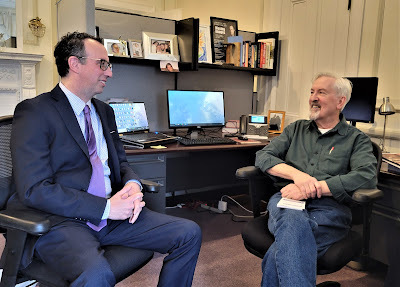 Jim Ludes, left, and me at my Pell Center desk.
Jim Ludes, left, and me at my Pell Center desk.We have formed partnerships with print newspapers – notably JohnHowell’s Warwick Beacon, Cranston Herald and Johnston SunRise – and partnershipswith other online media outlets including ecoRI News, RINewsToday and EastGreenwich News. We offer all of our content for free to our partners, and theyin turn offer theirs for free to us.
We publish every story and Q&A in both English andSpanish. I write many of our stories, with the rest provided by a growing corpsof freelance writers – some well-established and others still journalismstudents in college. We pay for their work and I mentor the students and other young freelancers.
To see the types of stories we write, visit our mission page.
Along the way, we have become members of the Society ofProfessional Journalists, the Online News Association, the New England FirstAmendment Coalition, the Alliance of Nonprofit News Outlets (ANNO), and LIONPublishers (Local, Independent, Online News).
All of this is possible thanks to the support of generousindividuals and organizations who see our model – one similar to many othersacross the U.S. – as a big part of the future of news in an era when many legacynewspapers have disappeared and others, barely staffed, have become ghostpapers. Our gratitude to all of our supporters today and in the future.
Our plan for Year Two is to grow – stay tuned for details ofthat!
I also must mention another initiative based at the PellCenter: Story in the Public Square, the multiple Telly-winning national PBS TV andSiriusXM show that has just been renewed for a 12th season. It starts inJanuary. Since beginning weekly production in January 2017 as a show seen only regionallyon our flagship station, Rhode Island PBS, we now are in more than 86% of thenation’s television markets with nearly 500 weekly broadcasts nationally – and wehave taped more than 300 guests, including journalists, filmmakers, editorialcartoonists, scientists, musicians, advocates, bestselling fiction andnon-fiction authors, poets, academics, still photographers, physicians, publichealth experts, actors, and Pulitzer-Prize winners.

A shout-out to our great team at Rhode Island PBS, led byChief Content Officer Jan Boyd and Production Manager Cherie O’Rourke!
In closing, let me express my hope that in all the work thatflows from the Pell Center, we have helped advance the public good. That wasthe aim of the late Senator Claiborne Pell, for whom the center is named, andit’s ours, too.
August 10, 2023
One book, four signings in Newport, Providence, Barrington and West Warwick
I will be speaking and signing copies of “Unfit to Print: AModern Media Satire” on just four occasions. First will be the evening ofWednesday, October 11, at a wine-and-cheese event at the Pell Center in Newport,R.I. After that, I will sign at three geographically diverse independent bookstores that I supportand encourage all readers to do likewise!
The bookstores and dates:
-- Thursday, October 26, 6 p.m., Books on the Square in Providence.
-- Saturday, October 28, 3 p.m., Barrington Books in Barrington.
-- Thursday, November 2, 6 p.m., the New Stillwater Books location in West Warwick.

One book, four signings
I will be speaking and signing copies of “Unfit to Print: AModern Media Satire” on just four occasions. First will be the evening ofWednesday, October 11, at a wine-and-cheese event at the Pell Center in Newport,R.I. After that at three geographically diverse independent bookstores that I supportand encourage all readers to do likewise!
The bookstores and dates:
-- Thursday, October 26, 6 p.m., Books on the Square in Providence.
-- Saturday, October 28, 3 p.m., Barrington Books in Barrington.
-- Thursday, November 2, 6 p.m., the New Stillwater Books location in West Warwick.
July 31, 2023
What they're saying about "Unfit to Print: A Modern Media Satire"
And the blurbs for "Unfit" are arriving! Thanks to all.
-- Llewellyn King, Executive Producer and Host of "White House Chronicle" on PBS, says:
“I have long admired G. Wayne Miller's writing. Now he haswritten a book, ‘Unfit to Print: A Modern Media Satire,’ that seems almost writtenjust for me. It deals with the decline and fall of regional and localnewspapers: how, as they were bleeding to death, hedge funds swept in andstripped what was left, firing staff and producing pamphlets in the place ofnewspapers. Miller knows this too well from his own experience.
“But Miller is a storyteller as well as a witness tohistory. So here he delivers a fantastical satire, bringing in, via the dreamsof the protagonist, none other than Benjamin Franklin to excoriate the moneypeople and to lament the damage their greed has done to democracy.
“This is a must-read for newspaper people and an engrossingyarn for everyone else -- those luckless ones who have never stepped into abusy newsroom and savored its intoxication.
“As to the message, it might have been called ‘Unsafe toIgnore.’ ”

July 7, 2023
The Ladd Center, 25 years after it closed.
Originally published in The Providence Journal, when I was a staff writer.
EXETER — The last lunch had ended when five residents of the Ladd Center,the state’s lone institution for people with developmental and intellectualdisabilities, were escorted into a van. The driver took them off into thebrightness of a pleasant spring day.
It was March 25, 1994.
After nine decades that began with compassion but included years of theworst neglect and abuse ever for many of Rhode Island’s most vulnerableresidents, Ladd was closed.
“The beast is dead,” said Robert L. Carl Jr., the administrator whoplayed a leading role in making Rhode Island the first state to shutter such aplace. “Nazi Germany killed these people. Rhode Island made a commitment totreat them with dignity and respect. Nobody will ever be able to throw away ahuman being again.”
A community system years in planning had brought people then described as“retarded” out of back wards in buildings that resembled warehouses into theeveryday world that most Rhode Islanders inhabited. Into the light, too, hadcome other individuals from private residences where families struggled withcare and suffocated under the crush of stigma and shame.
The beast really was dead, Carl recalled when The Journal visited him athis Jamestown home recently. A new day really had dawned.
“Nobody had ever set up a policy that said, ‘We're not going toinstitutionalize; we're going to take care of everybody in the community,’”Carl said. “Nobody. Nobody had ever tried to do that in the country, in theworld.”
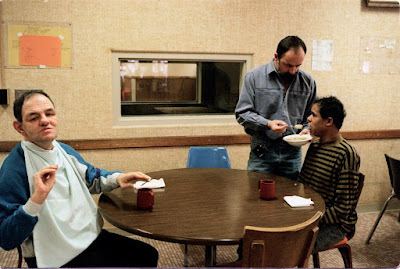
Withthe aid of an attendant, two of the last five residents of the Ladd Center,Raymond Guarnieri, left, and Anthony Stanton, eat before leaving for a grouphome on March 25, 1994, the day Ladd closed its doors. [The Providence Journal,file / Kathy Borchers]
Ironically, in light of what would follow, humane care was the philosophybehind the General Assembly’s 1907 decision to establish a safe place forindividuals deemed unable to care for themselves. At the time, many had beenlocked away in attics or basements, or were homeless, or incarcerated at thestate poorhouse at the Howard complex in Cranston, where Eleanor SlaterHospital and the Adult Correctional Institutions stand today. There, they werefurther victimized.
“For a long time it had been apparent to educators and officials of theState, the conduct of whose offices brought them into contact with thedefective, dependent and delinquent classes, that there was a great need of aninstitution in Rhode Island where boys and girls, or even young men and youngwomen, who were classed under the general head of ‘feeble-minded’ could becared for, properly trained and instructed, and in the end made as far aspossible self-supporting …” The Journalwrote on Feb. 2, 1908, the day after Ladd opened.
Set in one building on the Hoxsie Farm, which had acres of land forfuture expansion, the center was called the state School for the Feeble-Minded.Its first superintendent was the young Dr. Joseph H. Ladd, who came to RhodeIsland from Massachusetts.
The Ladd School, as it was later renamed, did provide sanctuary, for atime. It also served an ugly, if not officially proclaimed, purpose: itprevented its residents from marrying and having children, in accord with thenational eugenics movement, which supported laws and policies aimed atpreventing people judged “inferior” from reproducing, a policy implemented byHitler. In other states, developmentally disabled women were forciblysterilized, but Rhode Island had no such law and there is no confirmed recordof it happening, according to Universityof Vermont Prof. Lutz Kaelber, a scholar who has researched eugenics and Nazi killings of disabledchildren.
By the 1950s, Ladd’s turn-of-the-century promise of safety and care haddevolved into purgatory — almost literally, as a shocking photo exposé woulddemonstrate.
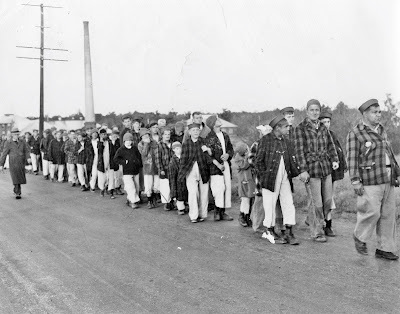
Residentsof what was then known as the Exeter School go on a walk for exercise in 1941.[The Providence Journal, files]
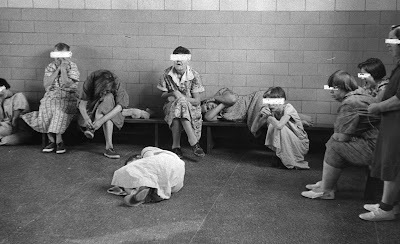
Ladd Center residents in 1977. Deplorable conditions in the 1970s at thestate-run facility prompted legal action and advocacy that eventually led toits closure. [The Providence Journal, files]
By 1956, when The Journal published the first investigation of deplorableconditions at Ladd, the old Hoxsie Farm was a sprawling complex of overcrowdedred-brick buildings where lives had been swallowed, its residents’ identitiesoften erased. Tangible evidence of that can be found at Ladd’s forgottencemetery, where small tombstones contain only serial numbers, no names or datesof birth or death. So, too, atthe potter’s field for the nameless deceased from another now-closed Rhode Islandinstitution for the mentally ill, the Institute of Mental Health.
In their March 1956 investigation, “The ForgottenTwo Per Cent,” Journal writers Selig Greenberg and George F. Troy Jr. chronicledhorrors that could be traced to the early days of Ladd, when its firstsuperintendent lobbied the General Assembly for increased financial resources —and was met with legislative disinterest, and worse.
“Dr. Ladd recalls that when he appeared before a state budget committeein 1913 to request an appropriation for teachers, he was told bluntly that‘instead of teachers there should be established an asphyxiation chamber’ atExeter School,” Greenberg wrote. Nazi Germany, as Carl later noted, didestablish them for the developmentally disabled.
Ladd returned to Exeter after his 1913 State House appearance, TheJournal wrote, “for a long and lonely siege of waiting and wrestling withinertia and neglect.”
Some progress eventually was made, but by 1956, during an era when Ladd’spopulation peaked at more than 1,000, The Journal found that “the legacy ofgross neglect in the past and continued skimping on appropriations” had createda situation involving “the anguish of blighted lives, of the failure to salvagehuman material that is not beyond saving — a failure for which no dollar andcent yardstick can ever be devised.”
Remedial efforts led to improvements, but by the late 1970s, Ladd wasstill more warehouse than home. In the wake of scandals in many states and thelandmark 1966 exposé by Burton Blatt, “Christmas in Purgatory,” which includedphotographs of abused and neglected Ladd residents, a consensus was emergingacross the U.S. that institutions had to be closed. Publication in 1972 of WolfWolfensberger’s revolutionary “The Principle of Normalization in HumanServices” also proved instrumental.
Onto the local scene came James V. Healey, an advocate behind a 1978federal class-action human-rights lawsuit against the state; Laddsuperintendent George W. Gunther Jr., father of a woman who lived at thecenter; and Carl. Gunther and Carl worked for the Department of Mental Health,Retardation and Hospitals (now the Department of Behavioral Healthcare,Developmental Disabilities and Hospitals), headed by Joseph J. Bevilacqua andhis successor, Thomas D. Romeo.
The first steps in building a community system were taken, with thesupport of Gov. J. Joseph Garrahy and the General Assembly, where Rep.Paul V. Sherlock championed people with developmental disabilities. Time andagain, voters approved bond issues to build community homes and programs.
The movement received a significant boost with publication of “The LaddSchool,” a 1977 Journal series by staff writers Peter Perl, Bruce DeSilva and Thomas E.Walsh. The seriesdocumented “serious deficiencies in medical and dental services, inadequatestaffing and poor training, overcrowding in some wards within the institution,improper medication, poor sanitation and physical plant,” among otherconditions. Some buildings were deemed fire traps.
“A Ladd School physician has been fired for allegedly stitching wounds oftwo medical patients without using an anesthetic,” was but one result of theinvestigation.
Convinced that the very existence of Ladd was intolerable, Gov. EdwardDiPrete, who followed Garrahy in office, announced in 1986 that the institutionwould close.
The beast is dead — but the model community system of the 1990s thatreplaced Ladd is inadequate a quarter of a century later, as a Journalinvestigation three years ago documented. Joseph Ladd’s “waiting and wrestling with inertia andneglect” are words that ring true today, albeit within a different context.
Anthony A. Antosh, director of Rhode Island College’s Paul V. SherlockCenter on Disabilities, and state Sen. Louis DiPalma, a champion for peoplewith developmental and intellectual disabilities who describes his ambition asbeing “a voice for the voiceless,” are among those leading the campaign forchange.
Both praise Behavioral Healthcare, Developmental Disabilities andHospitals Director Rebecca Boss and her staff for their efforts in addressingthe 2014 federal Department of Justice consent decree requiring Rhode Island tomore thoroughly integrate individuals into the community and away from thepost-Ladd model of sheltered workshops and other isolated settings. But bothassert that the system remains underfunded and stuck in policies and aphilosophy from an earlier century.
Antosh supports moving away from old-fashioned “person-centered planning”toward “person-centered thinking,” which he defines as ways toallow people with developmental or intellectual disabilities to have the samechoices and chances that anyone has. One’s life is not fulfilled when onlyemployment and housing needs are met, Antosh says.
He summarizes the new approach as “three big concepts.”
First, he said, is, “The person ought to be much more in charge of theirown life than they now are.
“Two, think about all of life, not just work,” he said. Entertainment,recreation and relationships fit that category.
“Three, because there's so much of life that should be spent in thecommunity doing all of those things, we need to think about how we engage thecommunity in a very different way than we currently do," Antosh said.
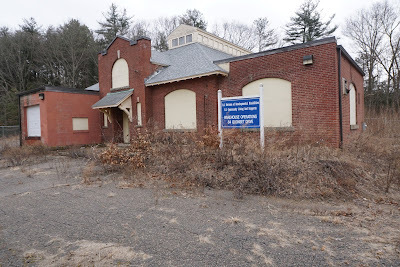
A decaying building is one of the few remnantsof the Ladd Center, in Exeter, which formerly housed Rhode Islanders withdevelopmental and intellectual disabilities. [The Providence Journal / SandorBodo]
A key to getting there, says DiPalma, is work by the General Assembly’sProject Sustainability Commission, which he chairs. Antosh belongs, as do Boss,state Medicaid director Patrick Tigue, and other government and privateofficials involved with the developmentally disabled.
“The system at a macro level needs to radically change from what we'redoing today,” DiPalma says. “We can't look at this from the perspective ofpruning the tree.”
“In the institution days, the institution was totally in control of everyminute of a person’s life,” Antosh says. “As we have gravitated toward morecommunity services, the service provider is still largely in control of majorportions of the person’s life. The revolution to me is to put the person andtheir family or their immediate contacts — whoever are their primary people intheir lives — more in control.”
Jimmy Isom, who was born in Cranston in 1946, was sent to Ladd at the ageof 6. He stayed 22 years. Retired now and living in an apartment in NorthProvidence, he enjoyed a long career working for Stop & Shop and othergrocers after leaving Ladd.
“I thought I’d never get out,” he recalled of his decades in Exeter in arecent interview. “It was no good. It was like getting locked up, almost like aprison.”
Isom is one of the former Ladd residents who is featured in the upcomingdocumentary “Best Judgment: Ladd School Lessons,” directed by filmmaker JimWolpaw.
“I’m glad I got out of Ladd School,” he says. “I don’t want to go back.”
Some People Who Lived at the LaddCenter... from Advocatesin Action RI on Vimeo.
A resident in her room at the Ladd Center in 1977. [The ProvidenceJournal / Anestis Diakopoulos]
One 'beast' slain, but barriers remain for those withdisabilities
After bearing witness tothe Ladd Center's final years, writer G. Wayne Miller reflects on how treatmenthas evolved for those living with mental and developmental disabilities.
BY G. WAYNE MILLER
EXETER — It is rare to have a front-row seat to history, but I had one 25years ago Monday, when the last residents left the Ladd Center and it closedfor good. Rhode Island was the first state to no longer have a publicinstitution for the developmentally and intellectually disabled, and watchingthose five men ride off to a better life gave us the chills.
“Us” was me; the late James V. Healey, an advocate who never accepted nofor an answer; George W. Gunther Jr., father of a daughter with special needswho became Ladd superintendent vowing to one day shutter the place; and RobertL. Carl Jr., the colorful state official whose nickname, “Wolfman,” ostensiblywas for his resemblance to the legendary DJ but really spoke to an almostsupernatural ability to get things done. Good things, in Carl’s case.
When the van carrying the final five had disappeared into the real world— never again to be chained to their beds, have their teeth drilled withoutanesthetic, or be hosed down naked en masse in what purportedly constitutedbathing — we gathered in Gunther’s office.
“The beast is dead,” Carl said.
I can still hear him — still remember the look on his face, a mix ofelation and fatigue — for the road to March 25, 1994, had been long and hard.In my four decades as a journalist, those four words remain my favorite quote.
Together with the efforts of Carl, Healey, Gunther and many others,Providence Journal exposés of Ladd’s barbarism starting in the 1950s had playeda role in killing the beast. Thanks to retired Journal editor Joel P. Rawson,who assigned me to a beat that also included the now-closed state Institute ofMental Health, another place of shame, I had covered Ladd since 1983.
By then, the age of abuse was ending.
But I had come to know that story well, from newspaper clippings andlawsuits and many hours spent with Healey and the boss of Gunther and Carl:Thomas D. Romeo, director of the state Department of Mental Health, Retardationand Hospitals, now the state Department of Behavioral Healthcare, DevelopmentalDisabilities and Hospitals.
And also, of course, the hundreds of hours I spent getting to know Laddpeople and former residents who had moved into the community.
My first experiences came during the year-long reporting behind mysix-part series “Building newlives: A revolution in care — How Rhode Island became a leader in movingmentally ill, retarded out of state hospitals and back into the real world,” which began on Nov.25, 1984.
Many morestories followed as the Ladd population dwindled and the community system grew. In1990, four years after Gov. Edward DiPrete had announced that Ladd would close,I lived for a week in one of Ladd’s remaining residences to write the July 19,1990, piece “Lorraine'sworld: As Ladd Center prepares to close, a new day dawns for the profoundlydisabled.”
Similarly, as residentsof the IMH in Cranston — another place of long-standing abuse and neglect — left for thecommunity, I was allowed to live a week there for a Journal story.
Mental-health and developmental-disability writing had become myjournalistic passions; they remain so today. And while one beast is dead, alook around reveals that other beasts are very much alive.
If only Ladd and the IMH had served as true cautionary tales.
July 2, 2023
"Unfit to Print: A Modern Media Satire." Order, read reviews and excerpts, plan to attend the launch event or a signing!
Read the reviews! Attend the launch or a signing!
The Kindle, Nook & Apple Books editions of "Unfit to Print: A Modern Media Satire" were published on September 20, 2023, and the print and audio editions will be published on October 10. Choose your seller:
-- Read select excerpts on Google Books.
When the print edition publishes, on October 10, "Unfit to Print" will also be available at your local bookstore and from online vendors. We launch with a wine-and-cheese event the evening of Oct. 11 at the Pell Center in Newport, R.I. A select number of signings will follow -- a link to the list is at the top of this post. And do visit The Facebook page.

Coming October 10: "Unfit to Print: A Modern Media Satire." Order, read reviews and excerpts, plan to attend the launch event or a signing!
Read the reviews! Attend the launch or a signing!
And consider ordering: The print, audio and eBook editions of "Unfit to Print: A Modern Media Satire" will be published on October 10, 2023. Preorders for the print edition and eBook are now being taken. Choose your seller:
-- Read select excerpts on Google Books.
When the print edition publishes, on October 10, "Unfit to Print" will also be available at your local bookstore and from online vendors. We launch with a wine-and-cheese event the evening of Oct. 11 at the Pell Center in Newport, R.I. A select number of signings will follow -- a link to the list is at the top of this post. And do visit The Facebook page.




